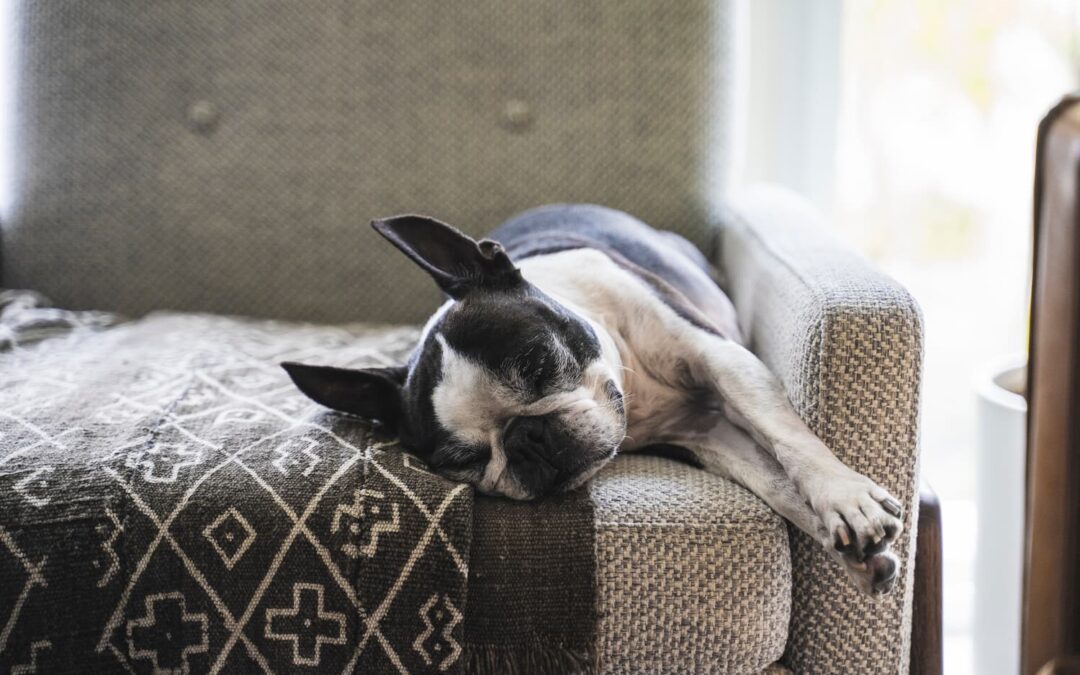One moment your dog is darting from room to room like a furry rocket. The next, he’s curled up in a sunbeam, fast asleep. Cats do it too—wild sprints followed by long, luxurious naps. While zoomies bring laughs and joy, those long stretches of sleep are far more than just downtime. They’re important for your pet’s physical and emotional health.
Understanding how sleep affects your pet’s daily behavior, energy levels, and long-term wellness can help you create a more peaceful, balanced life for your four-legged family members.
The Sleepy Truth: How Much is Normal?
Dogs and cats need far more sleep than most people realize. Puppies and kittens require 18–20 hours of rest each day to support their rapid growth and learning. Adult dogs typically sleep 12–14 hours, while senior dogs often need up to 16–18 hours. Adult cats snooze for 13–16 hours daily, with some reaching 20 during their lazier days—especially seniors.
Every pet is different. Sleep needs vary by age, breed, personality, and health, so it’s important to know what’s normal for your pet. Sleep is when the body heals, stress levels drop, and the immune system strengthens. When pets aren’t getting enough quality rest, it can lead to behavior issues, illness, or just that unmistakable sense that something’s “off.”
Zoomies: Nature’s Way of Burning Off Steam
Zoomies—technically called Frenetic Random Activity Periods (FRAPs)—are those spontaneous, high-speed sprints many dogs and cats suddenly burst into. These wild episodes are a normal, healthy way for pets to release pent-up energy, excitement, or tension. They’re especially common in puppies and kittens, often occurring after naps, baths, or during moments of excitement like greeting a favorite person.
While zoomies are typically harmless and even entertaining, they can also offer insight into your pet’s emotional and physical balance. If they happen too frequently or at odd times—like in the middle of the night—they might signal that your pet isn’t getting enough restful sleep or mental stimulation during the day.
Potential causes for concerning zoomie patterns include:
- Poor sleep quality that leaves your pet unable to regulate energy
- Overstimulation from too much activity or chaotic environments
- Anxiety or stress, such as separation anxiety or fear-based behaviors
- Boredom, especially in pets without enough enrichment or exercise
If your pet’s zoomies are accompanied by other changes—like disrupted sleep, appetite shifts, or clinginess—it could point to an underlying imbalance. A quick check-in with your veterinarian can help determine whether zoomies are just fun or a flag for something deeper.
Why Sleep Is So Important for Pet Health
Sleep plays a much bigger role in your pet’s health than many people realize. While your dog or cat may seem simply relaxed or cozy during nap time, their body and brain are actually hard at work repairing, restoring, and recharging.
Physical Healing Happens During Sleep
Sleep is when your pet’s body gets to work repairing cells, healing tissues, and restoring energy. It supports everything from muscle recovery to immune strength. Whether they’re a growing puppy or a senior cat, restful sleep helps pets stay physically strong and bounce back faster from illness or activity.
Sleep Keeps Your Pet Emotionally Balanced
Good sleep helps your pet stay calm and emotionally stable. It lowers stress hormones, reduces anxiety, and improves their ability to cope with everyday challenges. Pets who sleep well are less likely to act out, and they respond better to training and change.
Long-Term Health Depends on Sleep, Too
Chronic lack of sleep can lead to serious health concerns over time. Pets may develop weakened immunity, gain weight, or age more quickly. Supporting consistent, quality sleep now helps ensure your pet enjoys a healthier, happier life as they grow.
Prioritizing your pet’s sleep today helps protect their health tomorrow. A balanced sleep schedule can be just as vital to long-term wellness as vaccinations, diet, or exercise.
Red Flags: Is Your Pet Getting Enough Quality Rest?
It’s common to assume a pet that naps during the day is sleeping well—but not all sleep is truly restorative. Pets can struggle with poor sleep quality, and the signs are often subtle. Understanding what to look for can help you catch potential issues early.
- Restlessness and Nighttime Activity: If your pet is pacing, whining, or frequently shifting during sleep, it could be due to discomfort, anxiety, or inconsistent routines disrupting their rest.
- Mood Changes and Anxiety: Sleep-deprived pets may become irritable, clingy, or more reactive than usual. Increased vocalizing or hiding can also signal emotional stress tied to poor sleep.
- Physical Symptoms – Weight, Digestion, and Energy: Lack of quality sleep can impact metabolism, leading to changes in weight, appetite, and digestion—sometimes mistaken for diet issues.
- Loss of Interest in Play and Social Interaction: If your pet seems uninterested in toys, walks, or affection, he may be fatigued. Sleeping more but still acting tired is often a red flag for poor sleep.
If your pet shows any of these red flags, a disrupted sleep pattern—or even an underlying medical issue—could be the cause.
Creating a Sleep-Friendly Routine
You don’t need a high-tech pet bed or fancy gadgets to help your pet sleep better. What you do need is a little consistency and a calm environment.
Here are some tried-and-true ways to help your pet wind down for the night:
- Create a designated sleep space: Whether it’s a soft bed, a cozy crate, or a tucked-away corner of your bedroom, having a consistent spot to sleep helps signal safety and routine.
- Stick to a regular schedule: Try to feed, walk, and wind down at the same times each day. Dogs especially thrive on predictable routines.
- Limit food and play before bed: Save meals and energetic games for earlier in the evening. A stuffed chew toy or a slow walk can help transition into relaxation mode.
- Control the environment: Keep the sleep area quiet and dim. If your pet is sensitive to noise, consider white noise machines or calming music.
- Consider calming supplements or aids: Natural products like pheromone diffusers, calming chews, or anxiety wraps can help some pets relax at bedtime. You can find trusted options in our online pharmacy.
If your pet is still struggling to settle, it may be time to talk about anxiety management or explore whether an underlying medical issue is disrupting their sleep.
When Sleep Issues Signal Something More Serious
Sudden changes in sleep patterns shouldn’t be ignored. A pet who suddenly sleeps more—or much less—than usual may be signaling pain, stress, or an undiagnosed condition.
Common causes of sleep disturbances in pets include:
- Arthritis or orthopedic pain
- Cognitive dysfunction in senior pets (similar to dementia)
- Thyroid issues or hormonal imbalances
- Gastrointestinal discomfort
- Anxiety or environmental stress
Behavioral and physical changes often overlap, so it’s important to have a full health evaluation. Our team at South Hyland Pet Hospital has experience detecting the early signs of medical and emotional issues that can affect sleep—and we can help guide you toward solutions that make bedtime peaceful again.
Balanced Pets Are Happy Pets
Sleep is important—not optional—for your pet’s health. It helps their body heal, supports learning, and keeps their emotions balanced. Well-rested pets are happier, more playful, and easier to live with. If your pet is showing unusual behaviors, struggling to settle down, or just doesn’t seem like themselves, small changes to their sleep routine can make a big difference.
For expert guidance, trusted care, or help finding calming solutions, South Hyland Pet Hospital in Bloomington is just a call away. Schedule a visit or explore helpful products through their online pharmacy to give your pet the peaceful rest they deserve. Call (952) 884-1868—sweet dreams might be just around the corner.



